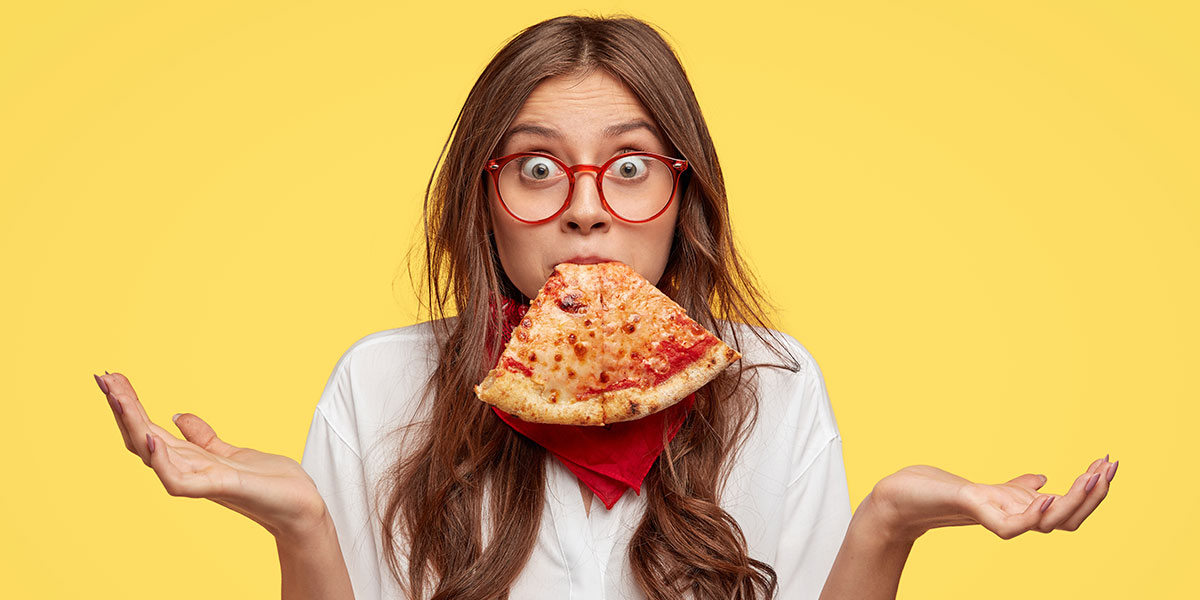The Drunchies, or eating while drunk or hungover, is a common phenomenon and while we know how moderation is key, more often than not, people make the midnight fast food run or refrigerator raid rather than a sensible balanced meal. Top that with an exorbitant amount of food and alcohol, it’s easy to see how the number of calories from binge drinking and eating can pack on extra pounds.
When the drunchies hit, people grab fatty, salty, and overall unhealthy foods. And fast-food chains know this. Why else do we see late-night fast-food restaurants serving a smorgasbord of delightfully greasy burgers, pizza, and tacos? Studies among college students show little water or non-alcoholic consumption during these binges, which can ultimately lead to dehydration. And it doesn’t end there… the cravings follow into the next day. So called “hangover cures”, such as eating foods that “soak up” alcohol and unstable blood glucose levels can increase hunger and hankering for take-out food.
Since we know unhealthy amounts of alcohol and poor food choices can cause a slew of health problems, why do so many binge eat while drinking alcohol? With study, researchers have found a link between binge drinking and eating and find a number of behind the scene factors at play.
Binge Eating and Drinking
Studies show a relationship between disordered eating and alcohol. Disordered eating includes bulimia nervosa, anorexia nervosa, and binge eating. In a way, disordered eating patterns are an addiction in that the person cannot stop despite the social, emotional, and physical repercussions. Once an “eating disorder not otherwise specified”, binge eaters will eat large amounts of food in a short amount of time and later feel shameful or guilty about overeating. Unlike bulimia, binge eaters do not take weight control measures, such as the use of laxatives or self-induced vomiting. That’s a lot of empty calories and this pattern of binge drinking and eating can cause serious health risks such as obesity, heart disease, cancer, diabetes, fertility issues in women, and severe anxiety and depression.
The Connection Between Binge Drinking and Eating
Despite all the negative health effects, dispelled myths about certain foods curing a hangover, and feelings of guilt and shame, why do so many binge drink and devour a whole pizza within one sitting?
Miscommunication in the Brain
By now we know how alcohol changes the wiring in the brain, and one of these misfires is impulse control. So, when someone grabs a bag of chips, 10-pack of tacos, or late-night Chinese take-out, they’re more likely to gobble it all down with little thought of the health implications. The faulty communication between neurons also plays a role, and can repeat the same messages, such as, “I’m hungry. Go eat!” when in fact you’re not hungry at all.
The Pleasure Principle: Dopamine
And, of course, we can’t forget about our good friend dopamine, the feel-good neurotransmitter. This reward chemical feels good, and with more food and alcohol, people can get more of it. (You can also get dopamine in healthier ways, such as exercise, learning a new skill, and socializing.)
Blood Sugar Loop da Loops
Alcohol misuse increase the risk of developing diabetes, and according to the American Diabetes Association (ADA), hypoglycemia (low blood sugar) is more troubling while drinking. Couple over drinking with binge eating, the risk is two-fold as eating massive quantities in food in a short period of time disrupts after meal blood sugar, and can lead to adult onset type 2 diabetes. This drop in blood sugar often make people feel hungry. In some instances, hypoglycemia can cause trembling, dizziness, blurred vision making it difficult to distinguish between drunkenness or a dangerously low blood sugar level.
How to Stop the Drunchies
The best cure for the late-night or hangover drunchies is to avoid alcohol. The American Institute for Cancer Research (AICR) recommends eating a balanced, healthy meal which includes a lean protein, vegetables or fruit, whole grains, and healthy fats and drink plenty of water to avoid dehydration. To lower health risks, the AICR suggests limiting drinks to 1 per day for women and 2 per day for men.
If you question your relationship with alcohol and food, contract Pura Vida for a confidential pre-admission screening.





